Related Research Articles
In nuclear strategy, minimal deterrence, also known as minimum deterrence and finite deterrence, is an application of deterrence theory in which a state possesses no more nuclear weapons than is necessary to deter an adversary from attacking. Pure minimal deterrence is a doctrine of no first use, holding that the only mission of nuclear weapons is to deter a nuclear adversary by making the cost of a first strike unacceptably high. To present a credible deterrent, there must be the assurance that any attack would trigger a retaliatory strike. In other words, minimal deterrence requires rejecting a counterforce strategy in favor of pursuing survivable force that can be used in a countervalue second strike.
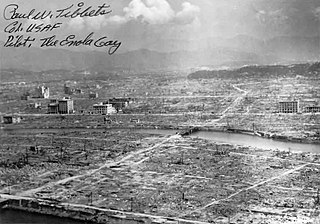
Mutually assured destruction (MAD) is a doctrine of military strategy and national security policy in which a full-scale use of nuclear weapons by two or more opposing sides would cause the complete annihilation of both the attacker and the defender. It is based on the theory of deterrence, which holds that the threat of using strong weapons against the enemy prevents the enemy's use of those same weapons. The strategy is a form of Nash equilibrium in which, once armed, neither side has any incentive to initiate a conflict or to disarm.

Nuclear strategy involves the development of doctrines and strategies for the production and use of nuclear weapons.

No first use (NFU) refers to a pledge or a policy by a nuclear power not to use nuclear weapons as a means of warfare unless first attacked by an adversary using nuclear weapons. This concept is also applied to chemical and biological warfare in case of the NFU policy of India.

James Rodney Schlesinger was an American economist and public servant who was best known for serving as Secretary of Defense from 1973 to 1975 under Presidents Richard Nixon and Gerald Ford. Prior to becoming Secretary of Defense, he served as Chair of Atomic Energy Commission (AEC) from 1971 to 1973, and as CIA Director for a few months in 1973. He became America's first Secretary of Energy under Jimmy Carter in 1977, serving until 1979.

Deterrence theory is based upon the concept which can be defined as the use of threats by one party to convince another party to refrain from initiating some course of action. The doctrine gained increased prominence as a military strategy during the Cold War with regard to the use of nuclear weapons and is related to but distinct from the concept of mutual assured destruction, which models the preventative nature of full-scale nuclear attack that would devastate both parties in a nuclear war. Deterrence is a strategy intended to dissuade an adversary from taking an action that has not yet started by means of threat of reprisal, or to prevent it from doing something that another state desires. The strategy is based on the psychological concept of the same name. A credible nuclear deterrent, Bernard Brodie wrote in 1959, must be always ready but never used.

India has developed and possesses weapons of mass destruction in the form of nuclear weapons. Although India has not released any official statements about the size of its nuclear arsenal, recent estimates suggest that India has 160 nuclear weapons and has produced enough weapons-grade plutonium for up to 161–200 nuclear weapons. In 1999, India was estimated to have 800 kg of separated reactor-grade plutonium, with a total amount of 8,300 kg of civilian plutonium, enough for approximately 1,000 nuclear weapons. India has conducted nuclear weapons tests in a pair of series namely Pokhran I and Pokhran II.

Pakistan is one of nine states to possess nuclear weapons. Pakistan began development of nuclear weapons in January 1972 under Prime Minister Zulfikar Ali Bhutto, who delegated the program to the Chairman of the Pakistan Atomic Energy Commission (PAEC) Munir Ahmad Khan with a commitment to having the bomb ready by the end of 1976. Since PAEC, consisting of over twenty laboratories and projects under nuclear engineer Munir Ahmad Khan, was falling behind schedule and having considerable difficulty producing fissile material, Abdul Qadeer Khan was brought from Europe by Bhutto at the end of 1974. As pointed out by Houston Wood, "The most difficult step in building a nuclear weapon is the production of fissile material"; as such, this work in producing fissile material as head of the Kahuta Project was pivotal to Pakistan developing the capability to detonate a nuclear bomb by the end of 1984.
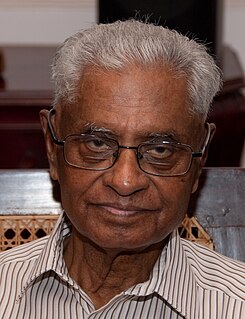
Krishnaswamy Subrahmanyam was a prominent international strategic affairs analyst, journalist and former Indian civil servant. Considered a proponent of Realpolitik, Subrahmanyam was an influential voice in Indian security affairs for a long time. He was most often referred to as the doyen of India's strategic affairs community, and as the premier ideological champion of India's nuclear deterrent. His son S Jaishankar was appointed India's External Affairs Minister in 2019.

Mayankodu Kelath Narayanan is a former Indian police officer. He was National Security Adviser of India from 2005 to 2010, assuming the role after the demise of his predecessor Jyotindra Nath Dixit in January 2005. Subsequently, he served as Governor of West Bengal from 2010 to 2014. The Government of India awarded him the civilian honour of Padma Shri in 1992.
The National Security Council (NSC) of India is an executive government agency tasked with advising the Prime Minister's Office on matters of national security and strategic interest. It was established by the former prime minister of India Atal Bihari Vajpayee on 19 November 1998, with Brajesh Mishra as the first National Security Advisor. Prior to the formation of the NSC, these activities were overseen by the Principal Secretary to the preceding Prime Minister.
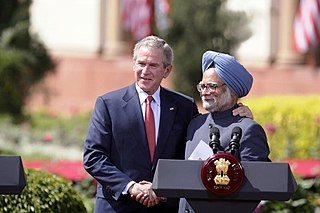
The 123 Agreement signed between the United States of America and the Republic of India is known as the U.S.–India Civil Nuclear Agreement or Indo-US nuclear deal. The framework for this agreement was a July 18, 2005, joint statement by then Indian Prime Minister Dr.Manmohan Singh and then U.S. President George W. Bush, under which India agreed to separate its civil and military nuclear facilities and to place all its civil nuclear facilities under International Atomic Energy Agency (IAEA) safeguards and, in exchange, the United States agreed to work toward full civil nuclear cooperation with India. This U.S.-India deal took more than three years to come to fruition as it had to go through several complex stages, including amendment of U.S. domestic law, especially the Atomic Energy Act of 1954, a civil-military nuclear Separation Plan in India, an India-IAEA safeguards (inspections) agreement and the grant of an exemption for India by the Nuclear Suppliers Group, an export-control cartel that had been formed mainly in response to India's first nuclear test in 1974. In its final shape, the deal places under permanent safeguards those nuclear facilities that India has identified as "civil" and permits broad civil nuclear cooperation, while excluding the transfer of "sensitive" equipment and technologies, including civil enrichment and reprocessing items even under IAEA safeguards. On August 18, 2008 the IAEA Board of Governors approved, and on February 2, 2009, India signed an India-specific safeguards agreement with the IAEA. After India brought this agreement into force, inspections began in a phased manner on the 35 civilian nuclear installations India has identified in its Separation Plan. The deal is seen as a watershed in U.S.-India relations and introduces a new aspect to international nonproliferation efforts. On August 1, 2008, the IAEA approved the safeguards agreement with India, after which the United States approached the Nuclear Suppliers Group (NSG) to grant a waiver to India to commence civilian nuclear trade. The 48-nation NSG granted the waiver to India on September 6, 2008 allowing it to access civilian nuclear technology and fuel from other countries. The implementation of this waiver made India the only known country with nuclear weapons which is not a party to the Non-Proliferation Treaty (NPT) but is still allowed to carry out nuclear commerce with the rest of the world.
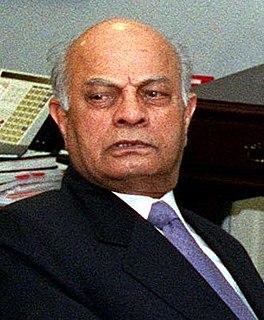
Brajesh Chandra Mishra was an Indian diplomat from the Indian Foreign Service and politician, best known for serving as Prime Minister Atal Bihari Vajpayee's principal secretary and National Security Advisor from 1998 to 2004.
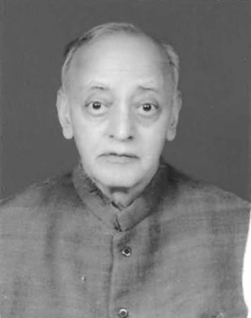
Lakshmi Chand Jain (1925–2010) was a political activist and writer. Later, he served at various times as a member of the Planning Commission, as Indian High commissioner to South Africa, as a member of the World Commission on Dams (WCD) and as secretary of the Indian Cooperative Union and the All-India Handicrafts Board. His position as the ambassador was terminated as the Vajpayee Government felt that he had not defended India's position on Nuclear tests effectively in South Africa. He eventually joined Indian National Congress. He was posthumously awarded Padma Vibhushan, the second highest civilian award, by the UPA government. However his family declined to accept the award, saying that Jain was against accepting State Honours.

Bharat Karnad is an emeritus professor in National Security Studies at the Centre for Policy Research, Delhi and a national security expert. He is the author of India's Nuclear Policy, Nuclear Weapons and Indian Security: The Realist Foundations of Strategy and author-editor of Future Imperilled: India's Security in the 1990s and Beyond.
The Minimum Credible Deterrence, is a defence and strategic principle on which the atomic weapons programme of Pakistan is based. This doctrine is not a part of the nuclear doctrine, which is designed for the use of the atomic weapons in a full-scale declared war if the conditions of the doctrine are surpassed. Instead, the policy of the Minimum Credible Deterrence falls under minimal deterrence as an inverse to the Mutually Assured Destruction (MAD), which is widely regarded as designed to dissuade India from taking any military actions against Pakistan, as it did in 1971, when Pakistan started the war. Pakistan refuses to adopt No first use policy, while the other regional powers India and China had adopted the policy. Pakistan's foreign minister Shamshad Ahmad had warned that if Pakistan is ever invaded or attacked, it will use "any weapon in its arsenal" to defend itself.
The Defence Planning Committee is a senior decision-making organisation created on 19 April 2018 by the Government of India.

The Integrated Defence Staff (IDS) is an organisation responsible for fostering coordination and enabling prioritisation across the different branches of the Indian Armed Forces. It is composed of representatives from the Indian Army, Indian Navy, Indian Air Force, Ministry of External Affairs, Defence Research and Development Organisation, Ministry of Defence and Ministry of Finance. The IDS is headed by Chief of Integrated Defence Staff along with Deputy Chiefs of Integrated Defence Staff. On December 24, 2019 the Cabinet Committee on Security (CCS) established the post of Chief of Defence Staff, a four-star general, a tri-service Chief, that shall lead the defence forces as well as play the role of head of the Department of Military Affairs. The body advises and assists the Chief of Defence Staff
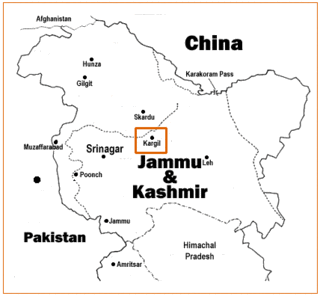
The Kargil Review Committee (KRC) was set up by the Government of India on 29 July 1999, three days after the end of the Kargil War. The committee was set up "to examine the sequence of events and make recommendations for the future".
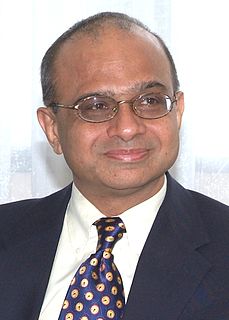
Brahma Chellaney is a New Delhi-based geostrategist and author who won the Asia Society's 2012 Bernard Schwartz Book Award. He is a columnist for Project Syndicate. He "commands respect", as one magazine put it, for his independent scholarship and for speaking truth to power. He received the $20,000 Bernard Schwartz Award from the New York-based Asia Society for his work, Water: Asia's New Battleground, published by Georgetown University Press.
References
- ↑ Mishra, Brajesh (17 August 1999). "Draft Report of National Security Advisory Board on Indian Nuclear Doctrine". Archived from the original on 16 January 2000. Retrieved 15 May 2013.
- ↑ Hosted at www.pugwash.org - Draft Report of National Security Advisory Board on Indian Nuclear Doctrine Archived 2011-06-13 at the Wayback Machine